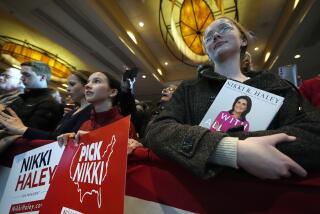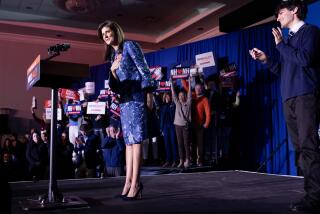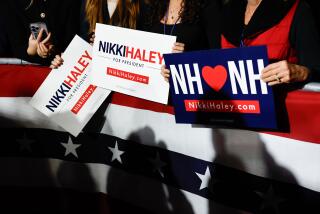CAMPAIGN ’96 : White House Sees GOP Vote as a Win-Win
- Share via
WASHINGTON — Who was the real winner of New Hampshire’s Republican primary?
At a jubilant White House on Wednesday, the answer was Bill Clinton.
In public, President Clinton and his aides tried to sound blase and uninterested in anything as raucous as a bitterly divided GOP field. “I regard this whole process as one for the Republicans to work out,” Clinton said. “I’m going to be president.”
But in private, White House aides and Clinton campaign officials were beaming over Patrick J. Buchanan’s New Hampshire victory. “It’s 90% positive for us,” a senior White House official said.
Buchanan’s win pleased the Clinton camp for two reasons: First, it virtually ensures that the Republicans will wage a costly, mutually destructive civil war over the next five weeks. “The longer it takes, the better it gets,” said a smiling Senate Minority Leader Tom Daschle (D-S.D.).
Second, the unexpected success of Buchanan’s strongly conservative message likely will pull his rivals, Senate Majority Leader Bob Dole of Kansas and former Tennessee Gov. Lamar Alexander, to the right on social issues--making it easier for Clinton to paint them as extremists.
“The Christian Coalition and the religious extremists in the Republican Party . . . are going to ask a very high price for their continued support,” predicted Clinton campaign spokeswoman Ann F. Lewis.
Clinton aides said that they do not believe Buchanan is likely to win the Republican nomination. But they are licking their chops over the prospect that the fiery columnist will continue picking up delegates during the remaining primaries and play a major role at the GOP convention in San Diego this August.
“If you liked Houston, you’ll love San Diego,” crowed one, referring to Buchanan’s fire-and-brimstone speech at the 1992 convention which turned many voters away from the party.
Clinton’s initial response, aides said, will be to obey an old political adage: When your enemies are destroying themselves, never interfere.
Instead, Clinton will spend the five remaining weeks of the primary season striving to look presidential, visiting schools and factories and environmental sites--”taking the Rose Garden on the road,” one aide said.
The president has never formally announced that he is running for reelection and he plans to delay that event as long as possible to maintain his above-the-fray look.
By April, Clinton aides expect the Republican field to have produced a presumptive candidate--and most say that they still expect Dole to be the GOP nominee. They also expect independent Ross Perot to enter as a third candidate.
But at that point, the long primary fight may have produced another, hidden advantage for the president: The Republicans will be low on campaign money but Clinton will still have almost $20 million in funds that must be used during the primary season--before the nominating conventions.
As a result, the president plans an unusual mid-year campaign, including costly television commercials, to try to increase his support--and counter Republican attacks--even before the national party conventions in August.
One major target of his May-June drive will be California, where Clinton strategists hope to lock up a substantial advantage early, in large part to avoid the huge expense of running television commercials in the fall.
“That was a big help in 1992,” noted one.
The early campaign will also be intended to shape the debate over the rest of the year.
The New Hampshire campaign taught Clinton strategists one clear lesson: Voters don’t like negative campaigning.
But it’s likely to occur, nonetheless, they predicted.
“We’re telling all our people [that] the Republican campaign is going to be mean and tough with lots of divisive rhetoric,” said Lewis. “If they’re prepared to do that to each other, imagine what they’re going to do to President Clinton.”
More to Read
Get the L.A. Times Politics newsletter
Deeply reported insights into legislation, politics and policy from Sacramento, Washington and beyond. In your inbox twice per week.
You may occasionally receive promotional content from the Los Angeles Times.











